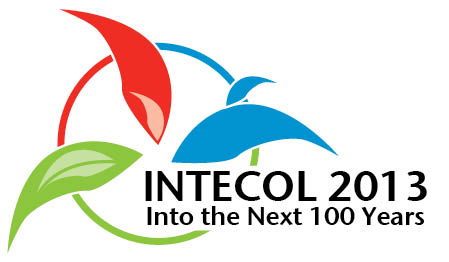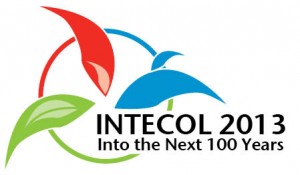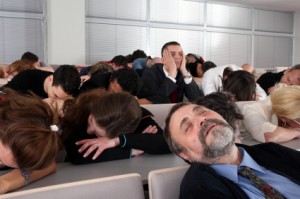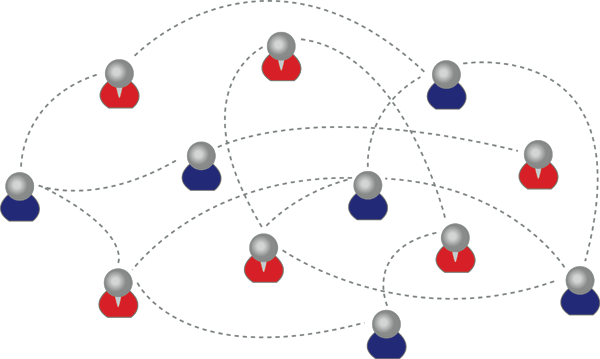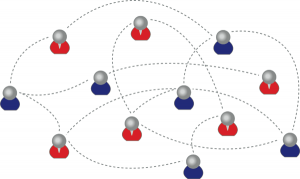
Science is a business like any other, and it’s hard to get things done if you don’t know anyone outside of your own department. Other scientists will review your papers and grants, invite you to give talks and hopefully employ you in the future. So the more people you know, the easier it gets. Conference season is just around the corner so I thought I’d continue my hints and tips series by talking about networking at conferences.
Step 1: Finding someone to network with…
Find someone you know and get them to introduce you to everyone they know. This person may be your supervisor, but postdocs and other PhD students can be just as helpful. Make sure you return the favour then everyone will know plenty of people! If you know several people, spend time with each of them meeting all their friends and maximizing the number of new people you meet.
It’s pretty rare to go to conference where you don’t know anyone beforehand. This is much harder than option 1 because you constantly have to make the effort to talk to new people which is pretty exhausting. In these situations try asking your supervisor beforehand if they can remotely introduce you to at least one person there. Then follow them around until you make new friends!
Go to conferences with easily achievable networking goals, for example choose one big name in your field and make sure you have a conversation with them, even if it’s short. However, don’t be that person who goes to conferences with a list of “important” people they want to meet and spends the whole time pestering the big names and ignoring everyone else. The people with the time and energy to start exciting new collaborations are usually students or postdocs, and these are also the people you’ll be meeting at conferences for the rest of your career. So make sure you network with them too!
At huge conferences like ESA it’s often hard to casually network because everyone has already scheduled meetings for every lunch break and evening before they arrive. If you really want to meet with someone drop them an email beforehand and see if you can arrange a quick meeting. Make sure you’re really specific about the meeting place, and don’t be too upset if they don’t show up, they were probably intercepted on the way!
Use social media! Twitter is a great way to arrange tweetups at conferences, and some societies also have Facebook pages where events are advertised. I haven’t tried this yet but I’m very excited about trying it at Evolution and ESEB this year.
Go to all the drinks receptions you can, but skip the conference dinner. This is just my opinion, but I’ve never done any good networking at a conference dinner. They can be fun, but usually they are at the end of the conference so everyone is hanging out with their friends and not really in the mood to talk about work. They are also expensive and the food is often awful. I usually go for dinner with some friends instead and we usually meet other people who aren’t at the conference dinner so we get to make new friends that way!
Step 2: OK so I’m chatting to a new person, what do I say?
I think you should always aim to have a person walk away from a conversation knowing the following pieces of information: your name, your institution and roughly what you work on. Aim to do the same with everyone you meet. If you meet someone particularly relevant to your research interests make a note of this before you forget.
Before going to a conference make sure you have a series of “elevator pitches” prepared. These should be the 1, 5 and 10 minute versions of what you’re currently interested in or working on. If you’re looking for jobs you should also prepare a quick outline of what you’d like to do in the future and the ideal place you’d like to work.
Be interested and interesting. Being interested just involves asking the other person about their work. Everyone likes to talk about their current pet project, and in general these are interesting so you don’t have to fake it! Ask questions where appropriate and be enthusiastic even if you couldn’t care less. If appropriate refer back to their talk/poster or recent papers. Being interesting is harder but again being enthusiastic helps. Talk about your work or the talks you’ve enjoyed at the conference or current areas in science that fascinate you. Hopefully after a somewhat artificial start to a conversation you’ll find yourself in a real and enjoyable chat.
Provided you get in a tiny bit of information about what you’re working on, you don’t have to talk about your work the whole time. Feel free to bemoan peer review, or the funding crisis or the bizarre nature of your structured PhD program. These are great conversational topics as everyone has an opinion and they affect all scientists. Also don’t worry about talking about normal topics – family, hobbies etc. Even the big names have lives outside of academia.
Step 3: Damage control (or OMG I can’t believe I just said that…)
One or two beers are your friends! Alcohol is a great way to reduce inhibitions and help you to chat to people you’d be too terrified to approach when sober. Three or more beers (depending on your alcohol tolerance) are not your friends. If your inhibitions are reduced to the point of dancing on the table people may not remember what you work on. Though they will remember your name…
To be fair, conferences often do involve a lot of drinking and it’s naïve to think you can avoid this entirely. People come to conferences to see old friends and enjoy themselves as well as for work so this should be respected. I think the rule of thumb for alcohol at conferences is to try and hang around with people at the same level of inebriation. Don’t be the drunk group in the quiet bar surrounded by sober people. Also remember that you need to get up the next day and go to lots of talks, so being hungover is not a good idea. Know your limits and never feel pressured into drinking if you don’t want to.
Don’t worry about making a fool of yourself. I’m the champion of this and somehow I still got a job. My classics (all while completely sober) include (1) being put in charge of cake at a meeting in London Zoo and promptly falling over and throwing all the cakes on the floor in front of the director; (2) missing my mouth while talking to a big name at Evolution and pouring coffee all down myself; (3) accidentally wearing a dress you could see my underwear through when meeting the Duke of Edinburgh; (4) complaining that an eminent scientist who published a lot of similar papers would probably publish their shopping list if they could – then realizing the person I was talking to was the scientist’s co-author; (5) insisting that ducks weren’t birds in front of an ornithologist (there’s a logical reasoning behind this but they didn’t stay to hear it); (6) trying to tap someone on the shoulder and accidentally stroking them instead etc. Most of these incidents are not remembered by anyone but my colleagues, and I don’t think they have influenced my career. So if you do say or do something ridiculous, don’t let it scare you away from talking to people in the future!
Those are my top tips; I hope some of them are helpful! I should point out that I don’t actually follow most of them, but I do try my best! Feel free to add more tips in the comments!
Author
Natalie Cooper
nhcooper123
ncooper[at]tcd.ie
Photo credit
wikimedia commons

